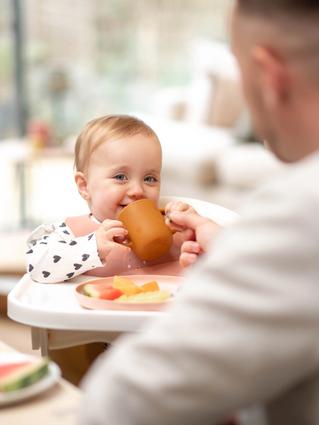
- Home
- Tools And Resources
- Baby Development Calendar
- 17 - Month - Old | Understanding, Mealtimes & Tips
17 months old
2 min
Toddlers of this age…
- Are rapidly developing their understanding - even if they don’t say many words, they understand much more
- May be able to carry out simple tasks on request (‘give me the ball’) and point to parts of their body (‘where’s your nose?’) or make animal noises (‘what does the cow say?’)
Fed up with saying “no”?
It's not much fun for either of you, is it? Fortunately, you can minimise the need for “no” by organising your home to be more child-friendly. Keeping phones, mobiles, fragile items, and remote controls high up and out of reach will increase your peace of mind. Try to reorganise cupboards, too, so that those in reach contain unbreakables or items that don’t matter.
Fussy with foods
Around this age, many toddlers start to become a little fussier with food – or too busy exploring to sit still for long at mealtimes. Sometimes, food is more fun to play with than to eat, and a carefully prepared plate might end up on the floor piece by piece. As frustrating as it can be, this is a normal stage in toddler development.
Try not to worry – toddlers often eat less than we expect, and they can thrive on a surprisingly limited variety of foods. If your go-to meals aren’t hitting the mark, offering something new now and then can help keep things interesting. The most important thing is to keep mealtimes relaxed, offer a variety of healthy options across the week, and trust that your little one will eat what they need.
Toddlers at the dining table
Mealtime with toddlers is not always easy – we know! Here are some hints and tips to help make toddler mealtimes go a bit more smoothly:
- Offer foods that are easy to pick up so they can feed themselves
- Give small portions; you can always offer more if your child is still hungry (see our guide to toddler portions for more information)
- Try not to spend more than 20-30 minutes at the table – after that, remove any uneaten food without making any comment
- If your toddler refuses a meal, don’t take it away and offer a different one in its place (they’ll soon learn to take advantage of this!) - but do try to make sure there is at least one food you know they like at each meal
- If a toddler hasn’t eaten much at mealtime, don’t give a snack soon after just to make sure they have eaten something – it's better to wait until the next regular meal or snack time
- Offer drinks throughout the day – water is the best choice
- Fruit juice is best given well-diluted and only at mealtimes
